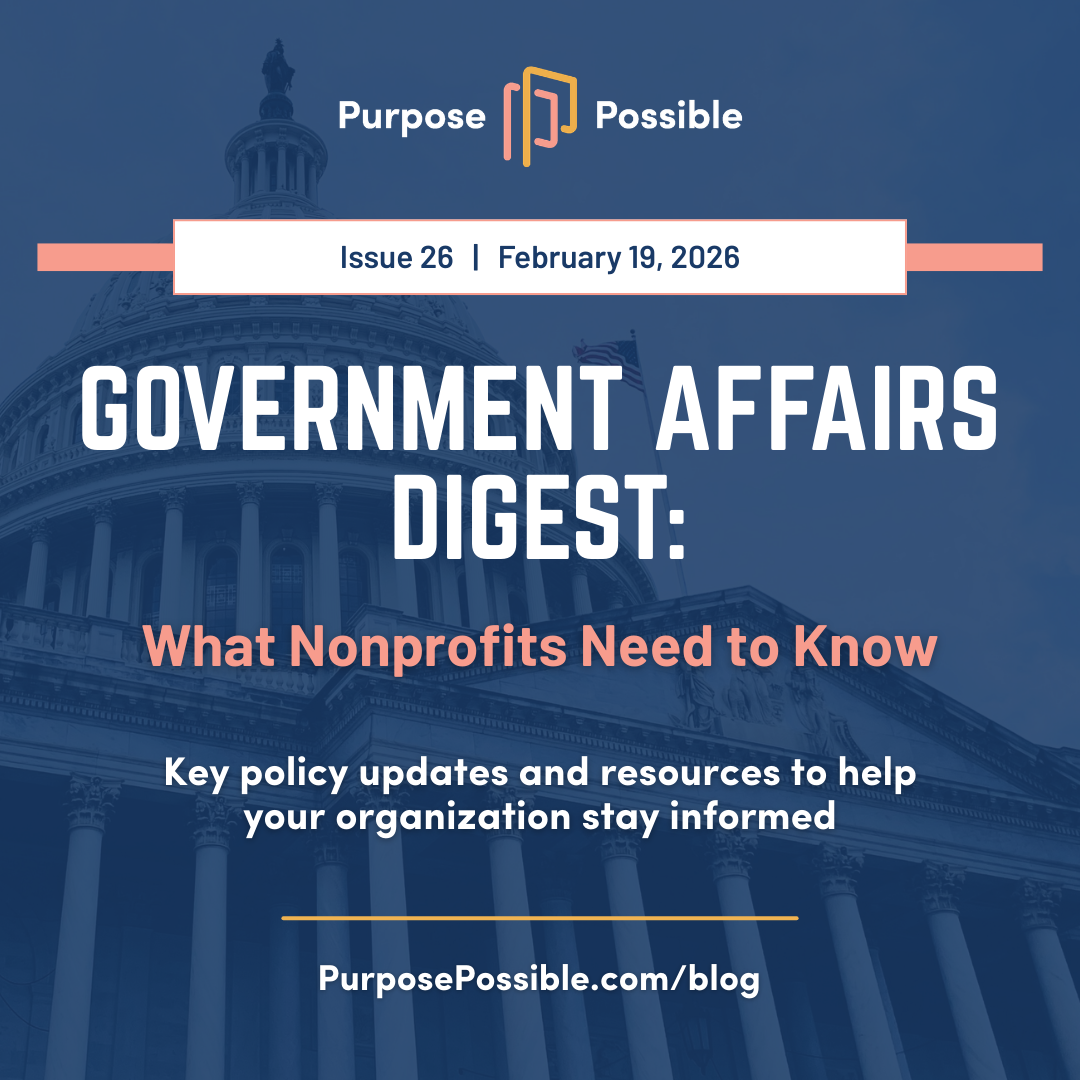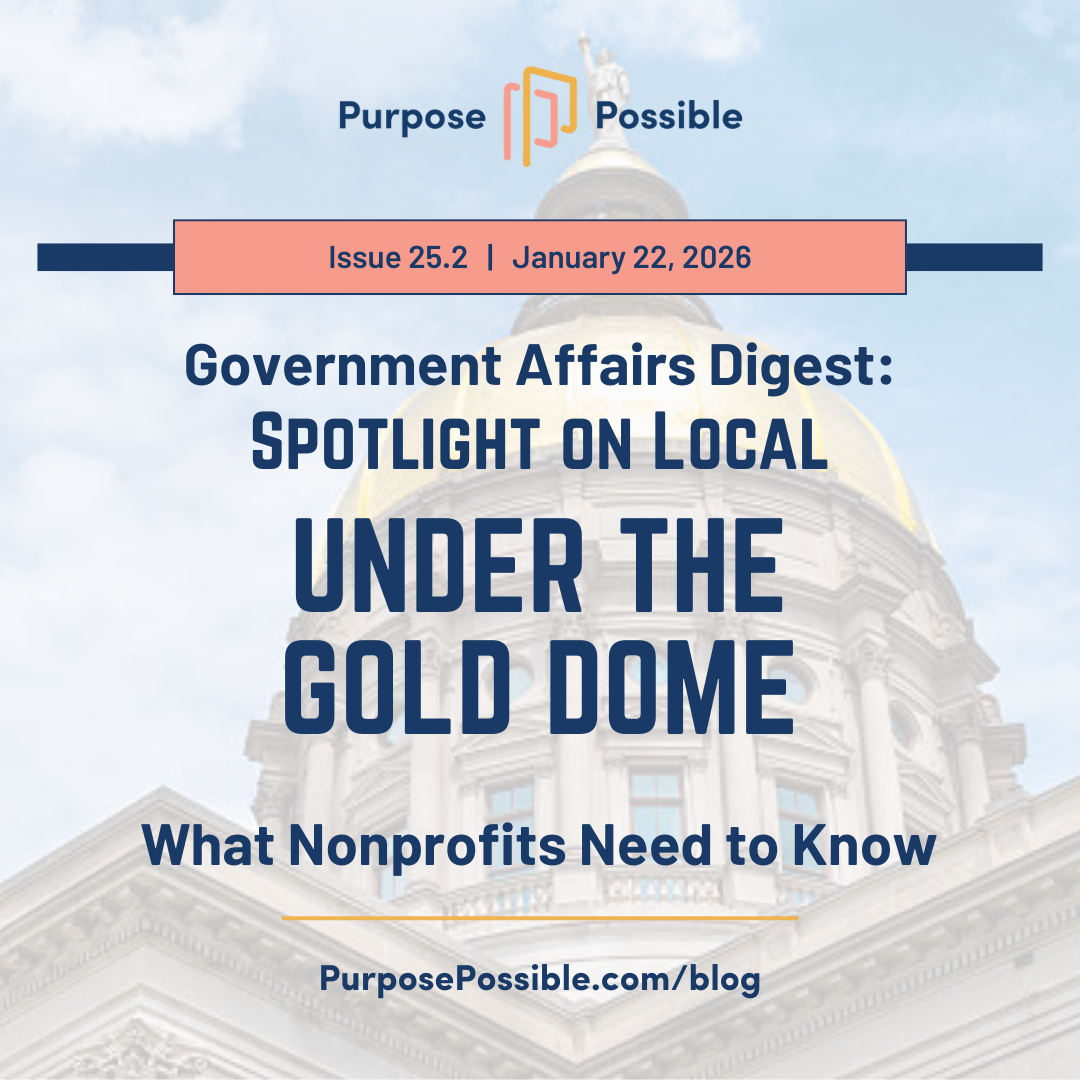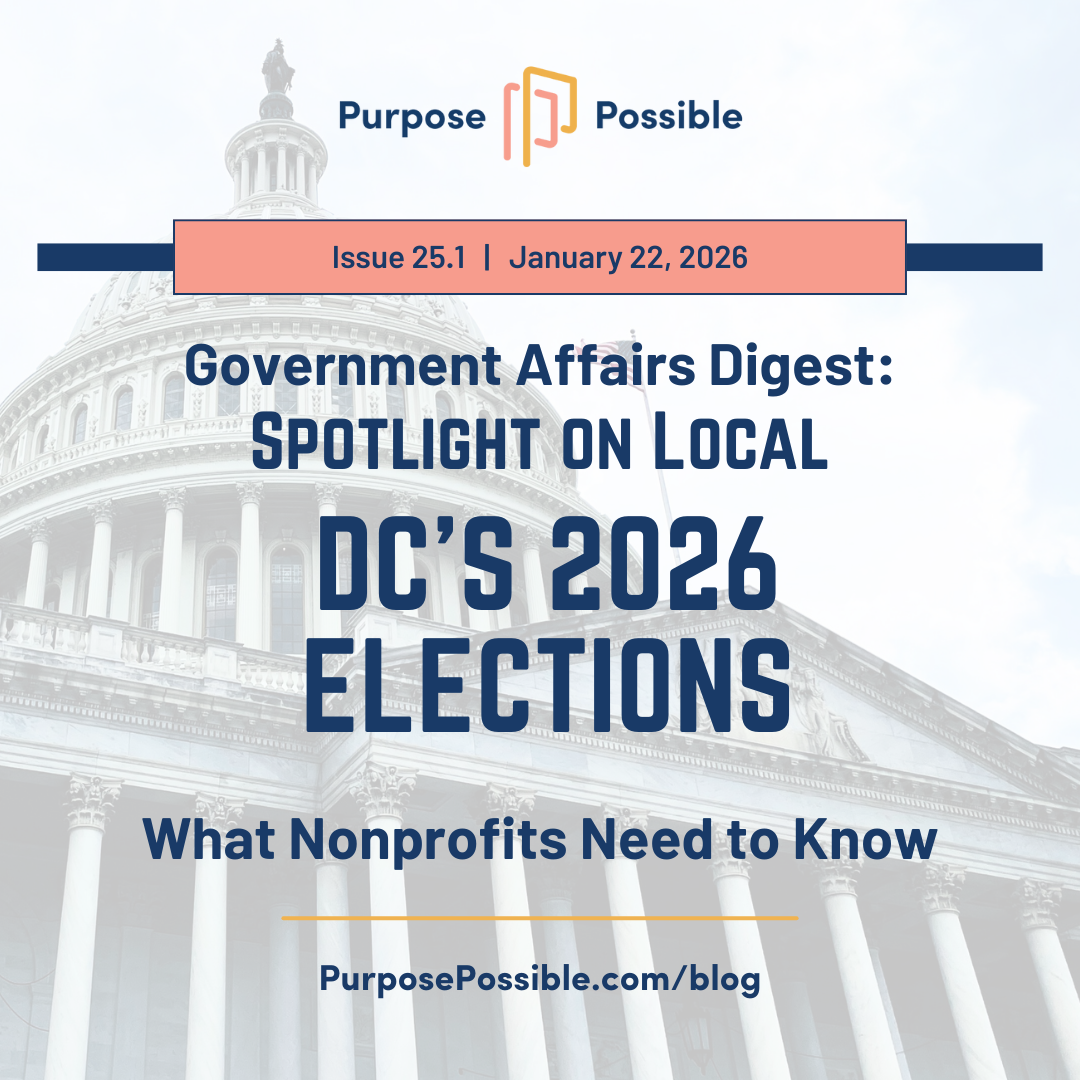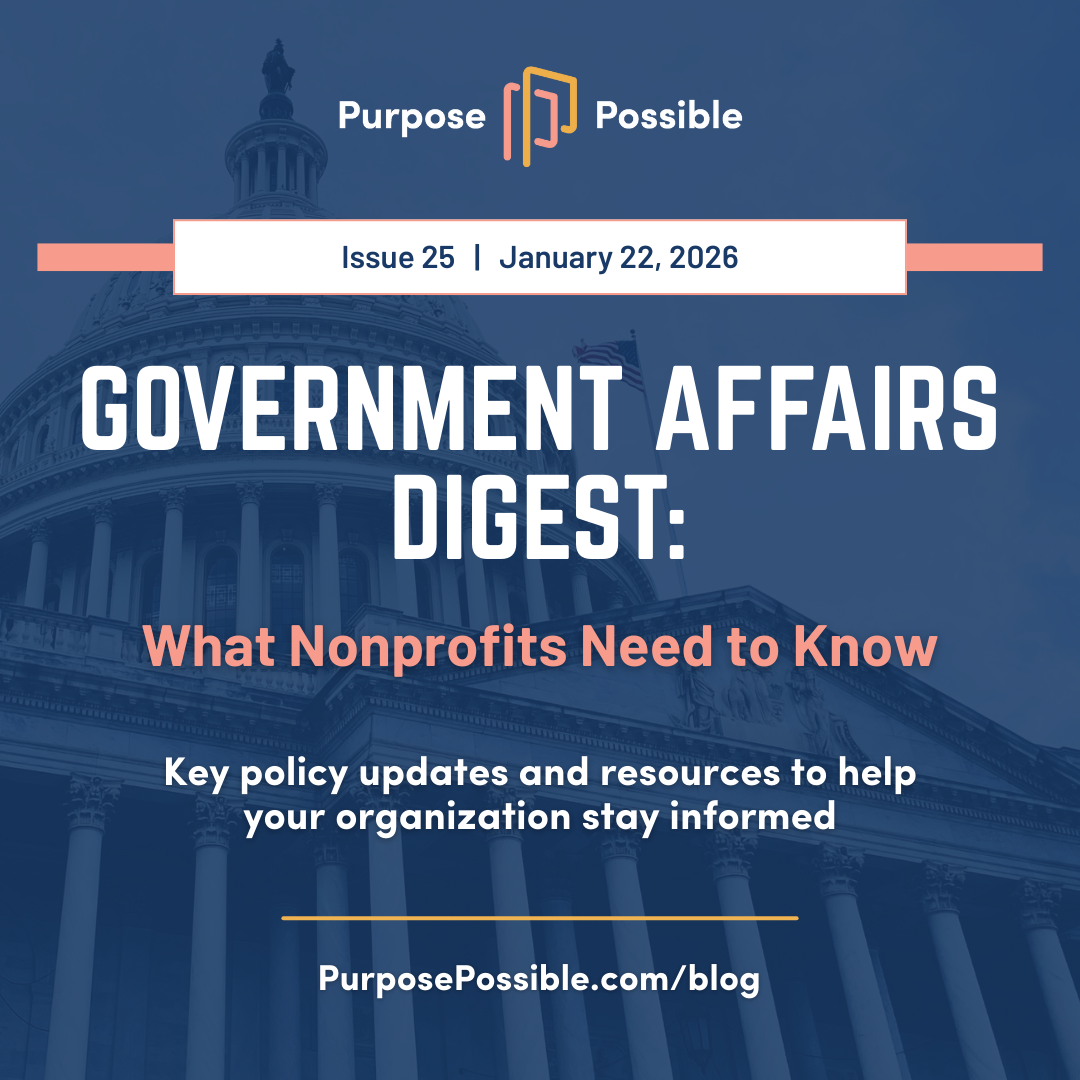Gov. Affairs | Issue 21 | October 16, 2025
Updated October 16, 2025 - This content will be updated as developments unfold.
Latest Developments:
As of today, the federal government is still in shutdown. To learn more about the shutdown and what it means for nonprofits, check out Purpose Possible’s recent, special edition of the Government Affairs Digest here.
Read: What a Long Shutdown Could Mean for Nonprofit Jobs, Revenue - Chronicle of Philanthropy
October 10: Trump Administration Terminates All Community Development Financial Institution Fund Staff
The Trump administration terminated all employees at the Treasury Department’s Community Development Financial Institutions Fund as part of a mass firing of government employees. The CDFI Fund is a Treasury-administered federal program that supports low-income and underserved communities by providing grants, technical assistance, capital, and certifications to community development financial institutions (CDFIs). CDFIs act as a financial backbone for community development, filling gaps left by mainstream banking. For nonprofits, they are both access points to capital for mission-driven projects, and allies in broader goals like revitalization, racial wealth building, or creative placemaking. When CDFI funding is cut or delayed, nonprofits, especially small, BIPOC-led, and place-based organizations, may lose access to affordable loans, project financing, and community investment tools.
Read: White House eliminates entire Community Development Financial Institutions Fund staff - POLITICO
September 30: Federal Judge Finds Limits on 501(c)(4)s’ Political Activity Unconstitutionally Vague
A federal district court in Freedom Path, Inc. v. IRS ruled that the IRS’s rules on how much political activity 501(c)(4) “social welfare” organizations may conduct, and how to define what counts as “political campaign intervention”, are unconstitutionally vague, because they fail to give clear standards or guidance. The court did not set new limits; instead, it ordered both sides to propose clearer, constitutionally permissible definitions. Because of this decision, nonprofits that engage in advocacy or election-related activity may gain more certainty or room to act, depending on how the new definitions emerge.
Read: Federal Judge Finds Limits on 501(c)(4)s’ Political Activity Unconstitutionally Vague - Lathrop GPM
September 29: DOJ official pushes US attorneys to probe Soros foundation
As reported by The New York Times, an attorney in Deputy Attorney General Todd Blanche’s office sent a note to half a dozen U.S. attorney offices asking that they prepare for investigations into Open Society Foundations.
'We're not afraid': George Soros' foundation on being Trump's next target - NPR
September 22: President Trump files Executive Order Designating Antifa as a Domestic Terrorist Organization
Trump signed an executive order designating antifa as a “domestic terrorist organization” and called on federal agencies to investigate organizations, donors, and financial networks suspected of supporting or funding antifa-related activity. The order describes antifa as a “militarist, anarchist enterprise” seeking to overthrow the U.S. government, law enforcement, and the system of law. However, the EO’s legal effect is contested, because U.S. law lacks a mechanism for formally designating domestic groups as terrorist organizations, raising First Amendment and constitutional concerns.
Read: What is antifa and why Trump wants to label it a terrorist organization | PBS News
Trump’s Orders Targeting Antifascism Aim to Criminalize Opposition | Brennan Center for Justice
A federal court ruled in favor of artists in Rhode Island Latino Arts v. National Endowment for the Arts, striking down an NEA rule that barred funding for projects “promoting gender ideology.” The judge found the policy to be a viewpoint-based restriction that violated the First Amendment and was arbitrary under the Administrative Procedure Act.
HUD Office of Fair Housing
A whistleblower complaint and internal documents reveal that the Trump administration has slashed funding and staffing for HUD’s Office of Fair Housing (reducing it by up to 65%) while reassigning or dismissing attorneys who spoke out.
SPECIAL UPDATE ON EFSP FUNDING (Emergency Food and Shelter Program) as of 10/14/25:
Phase 42 (FY 2024): Still Frozen/Delayed: Despite a temporary OMB pause being rescinded, multiple sources indicate the release of Phase 42 funds remains delayed and uncertain by FEMA/DHS, leaving local agencies without anticipated support. The Government Accountability Office (GAO) issued a decision in September 2025 concluding that FEMA violated the Impoundment Control Act (ICA) by improperly withholding or delaying the obligation of these funds.
Phase 43 (FY 2025): Awaiting Award: FEMA posted the Notice of Funding Opportunity (NOFO) for the FY 2025 EFSP (for the $117 million appropriated) in August 2025. The EFSP National Board has applied and is the sole eligible recipient. The status is still generally a waiting period for the National Board to receive the award from FEMA.
FY 2026: Debate Ongoing: The President's budget request did propose major cuts to non-defense discretionary spending, which includes EFSP. As of early October, the government is operating under Continuing Resolution (CR) due to a pending budget debate/government shutdown, meaning the final status of FY 2026 funding is still actively being lobbied for and negotiated in Congress. The threat to EFSP funding remains high.
Resources:
Protect Democracy Nonprofit Toolkit: Resources for organizations facing government investigations
Board Source A Risk and Resilience Checklist for Purpose-Driven Boards
PEN America What To Do If You’ve Been Doxed Or Placed On A Watchlist
ArentFox Schiff IRS and Treasury Release 2025-2026 Guidance Plan: What Tax-Exempt Organizations Need to Know
For a more simple explanation and what to watch out for, read Purpose Possible’s Treasury and IRS Priority Guidance Plan Info for Nonprofits.





